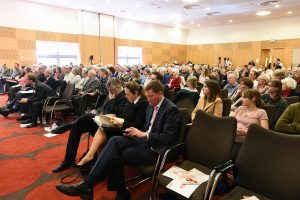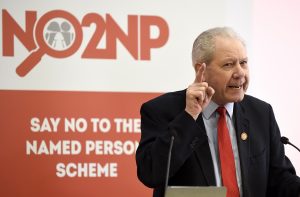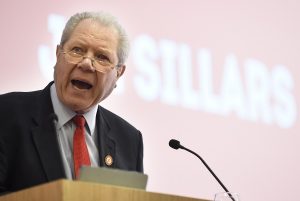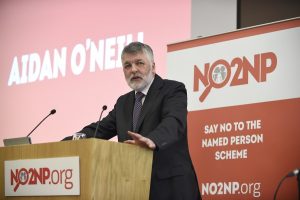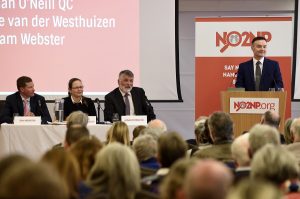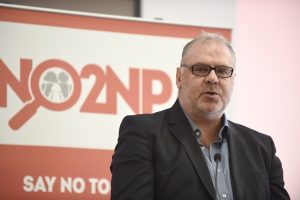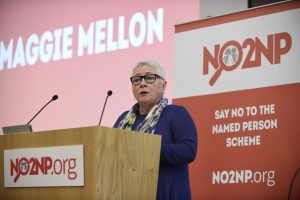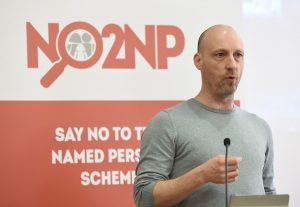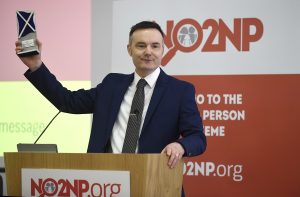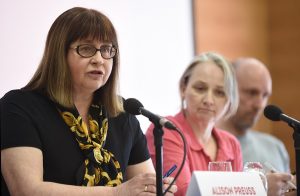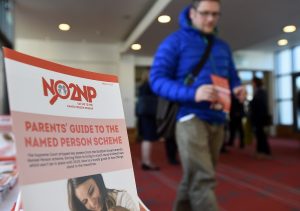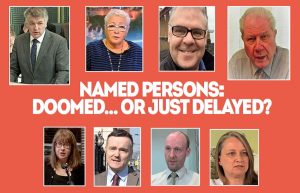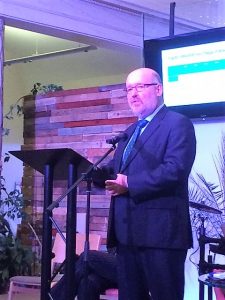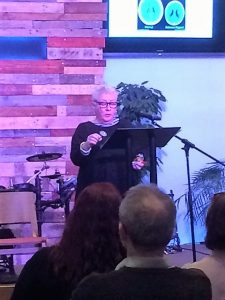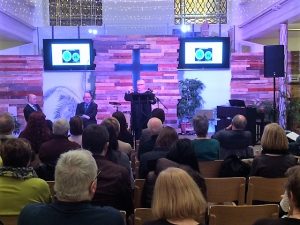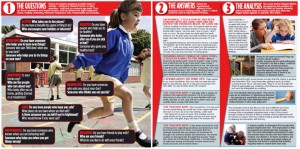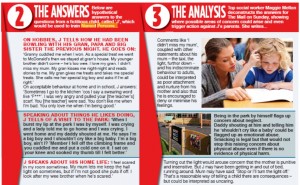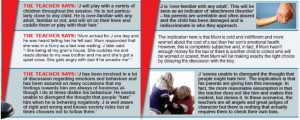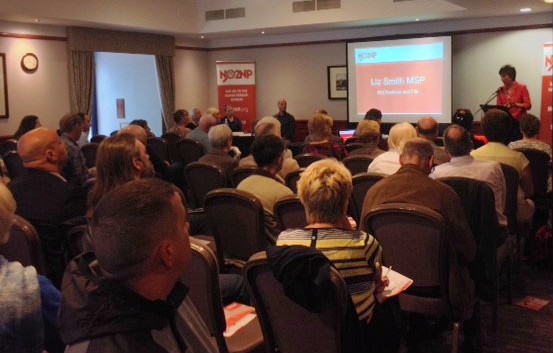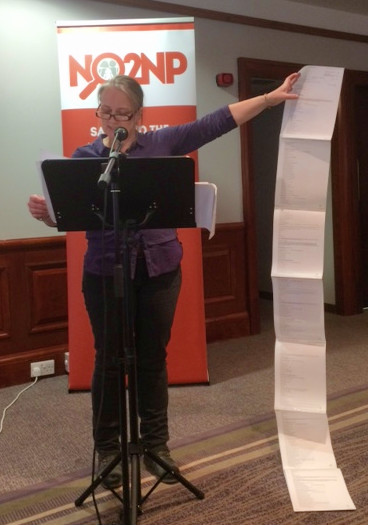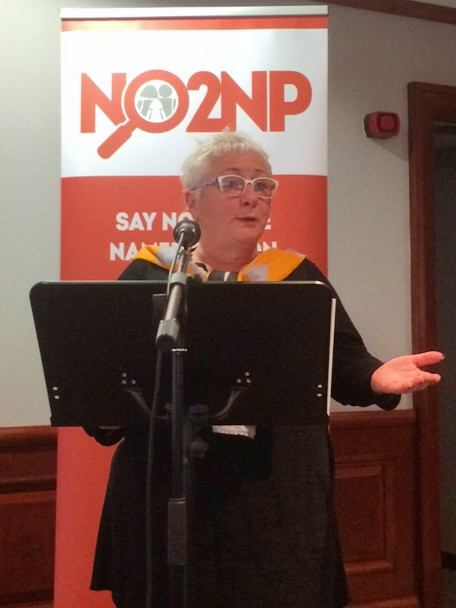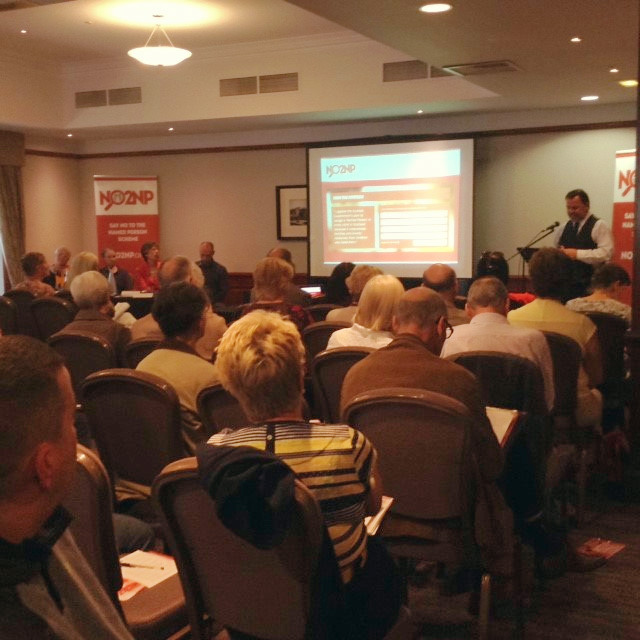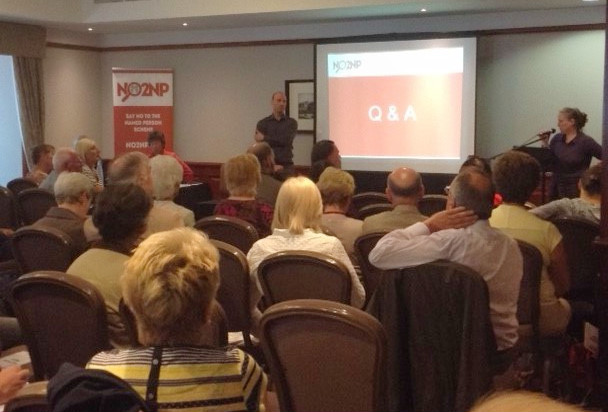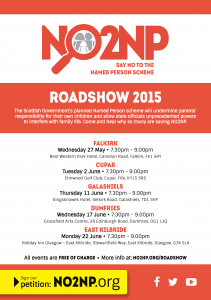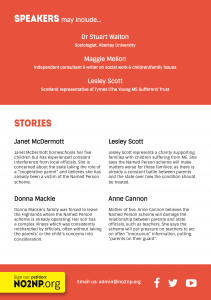Blog
Keeping you up to date on the progress of the Named Person scheme and the NO2NP campaign.
‘Plan B’ to by-pass MSPs and implement Named Person scheme by the back door, secret papers reveal
Posted 7 years agoThe Scottish Government is considering controversial proposals to implement the detested named person scheme “by the back door” … even if MSPs refuse to support changes to the law.
Discussion of a so-called “Plan B” is revealed in documents which have only been made public, after a Freedom of Information (FoI) request by NO2NP stalwart Lesley Scott.
The papers were produced following a meeting of unnamed top level government officials and advisors in February this year.
An annex under the headline “CONTINGENCY” states: “Contingency plan? What if the legislation is not passed?”
And adds: “Plan B for if Bill fails to make sure parts 4&5 can be implemented without information sharing.”
The scheme has been riddled with problems and last month a further delay was revealed.
John Swinney set up a panel to produce a Code of Practice by September 2018, after Holyrood’s Education and Skills Committee said it would not pass the legislation without one. But Professor Ian Welsh, chair of the panel, wrote to Mr Swinney to inform him that the panel would not be able to meet this deadline.
Lesley Scott of the TYMES Trust, said: “These worrying documents show the focus is clearly on implementing Named Person by the back door, regardless of whether the new Bill gets through Parliament. Clearly, we are now dealing with a Government which is ignoring the UK Supreme Court, has no regard for the elected representatives of the Scottish people and is determined to shun public opinion.
“They are riding roughshod over the democratic system in pursuit of a flawed, failed and discredited project.”
Ms Scott asked for all details from three key meetings of the Statutory Guidance Framework Group tasked to review the named person scheme in October and December last year and in February this year.
Only one set of minutes was released and NO2NP has been angered by the decision of the Scottish Government to redact the names of every single person who attended the key meetings.
Ms Scott has now contacted the Information Commissioner’s Office which deals with FoI appeals seeking a review of this decision.
Senior social worker Maggie Mellon, former chair of the Scottish Child Law Centre, said: “The names of all present – including the chair – are all redacted. So much for open government. There is no way of identifying which agencies are providing wrong advice or whether the persons present represent their colleagues and agencies properly.
“Is it now so toxic to be associated with the named person scheme that people are not willing to have their names made known?”
She added: “These are presumably many of the same people who advised the government so badly first time round, that breaching confidentiality is ok even when any concerns fall well below the proper threshold. What is so important about this flawed scheme that it has to be pushed through?”
NO2NP spokesman Simon Calvert, said: “This proposed scheme was intrusive, incomprehensible and illegal. It still is, and continued implementation of it must cease. As must plans to continue its implementation in the future.
Read more:
The Scotsman: Government ready with Plan B for Named Person
The Times: Scottish campaigners against the named person scheme fear the government will implement it through ‘the back door’
Evidence is stacking up against the Named Person scheme
Posted 8 years agoYesterday Holyrood’s Education and Skills Committee had its sixth evidence session on the Named Person information sharing Bill.
And it’s not looking good for the Scottish Government.
The proposals have not only been criticised by lawyers, health professionals, teachers and data-sharing experts, but even MSPs have had enough.
MSPs on the Delegated Powers and Law Reform Committee were not satisfied with the answers they got from John Swinney in September. The committee has now recommended that the Scottish Government “revisits its approach to the Code of Practice”, which is central to Named Person practice on the ground.
NO2NP spokesman Simon Calvert commented: “This is a real rebuke for John Swinney. Hidden beneath the bland wording of a Parliamentary press release is the anger of a committee of MSPs denied the opportunity to exercise their constitutional and democratic duty … on behalf of the families of the country they represent.”
Maggie Mellon, giving evidence on behalf of the NO2NP campaign yesterday, told the Education and Skills Committee: “The problem we need to address is: is this about parents or telling people what’s good for them and acting in a way we all think is good for them, rather than listening to what they want?”
She raised concern that there was still a lack of definition for “wellbeing” and commented: “Asking for compulsory intervention on basis of subjective indicators and requiring professionals to interfere is not helpful”.
She asserted: “Are we going to get it right this time?”
Last week DCI Norman Conway, representing Police Scotland, appeared to admit to the Education and Skills Committee that the police had been involved in years of unlawful data sharing. He blamed the ICO guidance from 2013 and said, “we started to believe we were in good grounds to actually actively share wellbeing information regarding children”.
DCI Conway told MSPs: “And actually what’s happened following the Supreme Court judgment is that we have really tightened up in terms of individual rights, we’ve really tightened up in terms of the information that’s being shared”.
Commenting on the news, NO2NP spokesman Simon Calvert said: “It’s now been publicly confirmed for the first time that for three years the police – and possibly other organisations who relied on the ICO advice – were routinely disclosing the private and confidential information of children and families in an outrageous invasion of privacy and human rights.
“This was all happening before the scheme was fully implemented. Imagine what would have awaited families if the Supreme Court had not come to their defence?”
The evidence is stacking up against the Named Person scheme. When will the Scottish Government will admit it got it wrong for Scottish families and drop these intrusive plans?
NO2NP event: Sillars tells Swinney ‘do a Hammond’ with Named Persons
Posted 8 years agoAround 250 people turned out for a NO2NP special event in Edinburgh on Monday in a major rally against the Named Person scheme. People travelled from all over, coming from Moray, the Borders, Perthshire, Dundee and even near Inverness!
Speakers at the John McIntyre Conference Centre included former deputy leader of the SNP Jim Sillars, and prominent human rights QC Aidan O’Neill who successfully represented campaigners involved with NO2NP in court.
Journalist and commentator Kevin McKenna and NO2NP supporters Dr Stuart Waiton and Maggie Mellon also took to the podium.
Jim Sillars urged Deputy First Minister John Swinney to “do a Hammond” on the Named Person scheme and drop the plans.
He said: “My advice would be to do a Hammond. Last week the government at Westminster was in a hole. It had the brains to stop digging and my advice to this government is this isn’t going to work.
“This is going to be a punishment on you over the years ahead. Stop digging, get out the hole and abandon it.”
Aidan O’Neill QC, a leading human rights lawyer who was behind the successful Named Person Supreme Court challenge, spoke about the judgment and its implications for families. He explained the law and why the Supreme Court ruled the way it did.
He said the Named Person legislation was written in a “vague language of aspiration when it should be talking specifically in terms of obligation” and that’s why the Supreme Court ruled that it was “not in accordance with law”.
He was then joined by two members of his legal team, Laura-Anne van der Westhuizen and Sam Webster, to answer questions from the audience about the judgment.
Journalist and commentator Kevin McKenna spoke about media reporting of the Named Person scheme and encouraged delegates to contact newspapers to tell their stories.
Speaking about the scheme he said: “My chief concern is that it will inevitably, even if inadvertently, target families who are encountering chronic social disadvantage”.
Independent social worker Maggie Mellon spoke about the culture and practice of children’s services on the ground. She said families had wanted a single point of contact for parents, but instead the Government had created in the Named Person scheme “a point of contact about parents”.
She added that the legislation had “made parents and families accountable to services, it didn’t in any way make services accountable to parents”.
Dr Stuart Waiton, sociology and criminology lecturer at Abertay University, said the Named Person scheme undermines families and the idea of privacy. He spoke about the influence of early intervention and how it was a key driver of the Named Person scheme.
NO2NP spokesman Simon Calvert spoke about the breadth and success of the NO2NP campaign and encouraged supporters to get involved.
The event finished with a lively question and answer session with NO2NP stalwarts Lesley Scott and Alison Preuss joining the panel.
Lesley and Alison also featured in an exclusive video, where they shared their experience of being involved in the campaign and the challenges that lie ahead.
The audience also viewed a moving video featuring two parents telling their stories about the Named Person scheme and the traumatic effect it had on their families.
Delegates were also encouraged to take armfuls of a new NO2NP leaflet, Parents’ Guide to the Named Person Scheme, which was launched at the event.
The handy guide is designed to help parents understand their rights following the Supreme Court judgment. You can request free paper copies by emailing admin@no2np.org or download a PDF version here.
Book now: Special one-off NO2NP national gathering in March
Posted 8 years agoNO2NP will be holding a one-off special event, Named Persons: Doomed… or just delayed? in Edinburgh on Monday 20 March, 11:00am – 1:15pm.
Named Persons: Doomed… or just delayed?
Monday 20 March 2017, 11am – 1:15pm
John McIntyre Conference Centre, Edinburgh
BOOK NOW FOR THIS FREE EVENT
Do you want the unique opportunity to question the QC behind the Supreme Court legal challenge?
Would you like to be clear about your legal rights following the Supreme Court judgment and get equipped to take action in your community?
Do you want to know how to make MSPs more responsive to the concerns of parents?
Then come along to this one-off free event and hear from key figures involved in opposing the Named Person scheme; including legal experts, parents and key members of the NO2NP campaign. BOOK NOW
Speakers will include:
- Aidan O’Neill QC – Leading human rights lawyer who acted on behalf of parties to the successful Named Person legal action
- Jim Sillars – Former deputy leader of the SNP, who said the Named Persons legislation was “riddled with ambiguity”.
- Kevin McKenna – Columnist regularly featured in The National, The Herald and The Guardian, who has warned against the “deeply flawed” Named Persons legislation
- Maggie Mellon – Independent social work consultant
- Dr Stuart Waiton – Sociology and criminology lecturer at Abertay University
Maggie Mellon debates NSPCC’s Matt Forde in SASO Named Persons event
Posted 8 years agoIt was another packed house for the latest Named Person debate, this time from St George’s Tron, Buchanan Street, Glasgow last Thursday evening. SASO (Scottish Association for the Study of Offending) were the hosts with Sheriff Ian Fleming chairing the event.
First to the lectern was Matt Forde, National Head of Service, Scotland, at NSPCC. Matt took everyone back to the 1990s talking of society’s propensity to lock up people and criminalise children as young as 8. He talked of how the murder of Jamie Bulger at the hands of two other children had led to a societal and political view of children as ‘out of control’, even “feral”. However, in the Q&A that followed, NO2NP’s own Jenny Cunningham rebuffed this vision of the period stating that she remembered it as being a time when focus started to turn to parent-blaming for all the ills of society. Matt contended that “rhetoric was very strong at that time – today it is a very different debate.”
That debate, Matt stated, began a process to bring about social change that would improve the situation for children. Through this, specifically a review of the children’s hearing system, came GIRFEC and, after the SNP won a minority Government in 2007 they “started to speak more positively about young people” in a wish to ‘Make Scotland the Best Place to Grow up’.
According to the NSPCC wellbeing is defined by SHANARRI, despite the judgment from the UK Supreme Court last year which stated: “‘Wellbeing’ is not defined” and said about SHANARRI: “These factors are not themselves defined, and in some cases are notably vague.”
Matt spoke about how well GIRFEC and the Named Person had worked in Highland. He noted that the NSPCC support early intervention and the principles of the Children and Young People Act, including Named Persons, adding that GIRFEC and Named Persons are just one way to meet the needs of children.
Next up was NO2NP regular Maggie Mellon who maintained that “for most of the children referred to hearings, it would have been better to have had no such formal intervention at all.”
Maggie explained that in England and Scotland the criminal justice system was now “rowing back” from looking to alternatives to incarceration, which simply led to pulling in “more people who would not previously have become involved in the criminal justice system”.
“But we are now going there with children and families,” Maggie warned. “In the world of GIRFEC and Named Persons, ‘risk’ is ascribed to a wide range of social or other circumstances. This leads to negative attention, a higher risk attribution, risk-averse professional behaviour and systems. As well as negative impacts on children, families and the wider civic society. This is, in essence, my case against the Named Person”, Maggie said.
The law, Maggie insisted, “doesn’t lie” and she pointed out that there is “no duty to respond to parents’ or children’s requests, no mention of any duty to consult, collaborate or advocate for a parent or child”.
Maggie also went into the origins of early intervention, debunking the Hackman Curve (a source of much excitement by civil servants over potential savings through prevention science) as simply “a hypothesis and one that has actually been disproved by any number of actual research studies”.
In a well-argued and evidenced talk, Maggie summed up by saying “We don’t need Named Persons. The whole project is a diversion from real prevention and social justice.”
Some interesting points were made in the Q&A, none, it should be noted in favour of the Named Person policy. David Scott, a regular attendee at NO2NP events, questioned the term ‘risk’ and its use in the assessment of children and families pointing out that ‘risk’ is defined as a combination of the probability of an event and the consequences. Probability, he pointed out, has two separate meanings which are conflated; one is objectively measureable and applies to recurring events. The second definition which applies to unique events such as those occurring in families is ‘belief’. Therefore when officials talk of ‘risk’, they merely speak of their own belief giving it simply a veneer of objectivity.
Once again, the case for the Named Person crumbles when exposed to careful and accurate analysis.
IdeaSpace debates child protection: wellbeing or a climate of fear?
Posted 9 years agoAlongside the SNP Conference in Glasgow last week, IdeaSpace hosted a fringe event debate on Friday on the subject: “Is Scottish child protection promoting wellbeing or a climate of fear?”
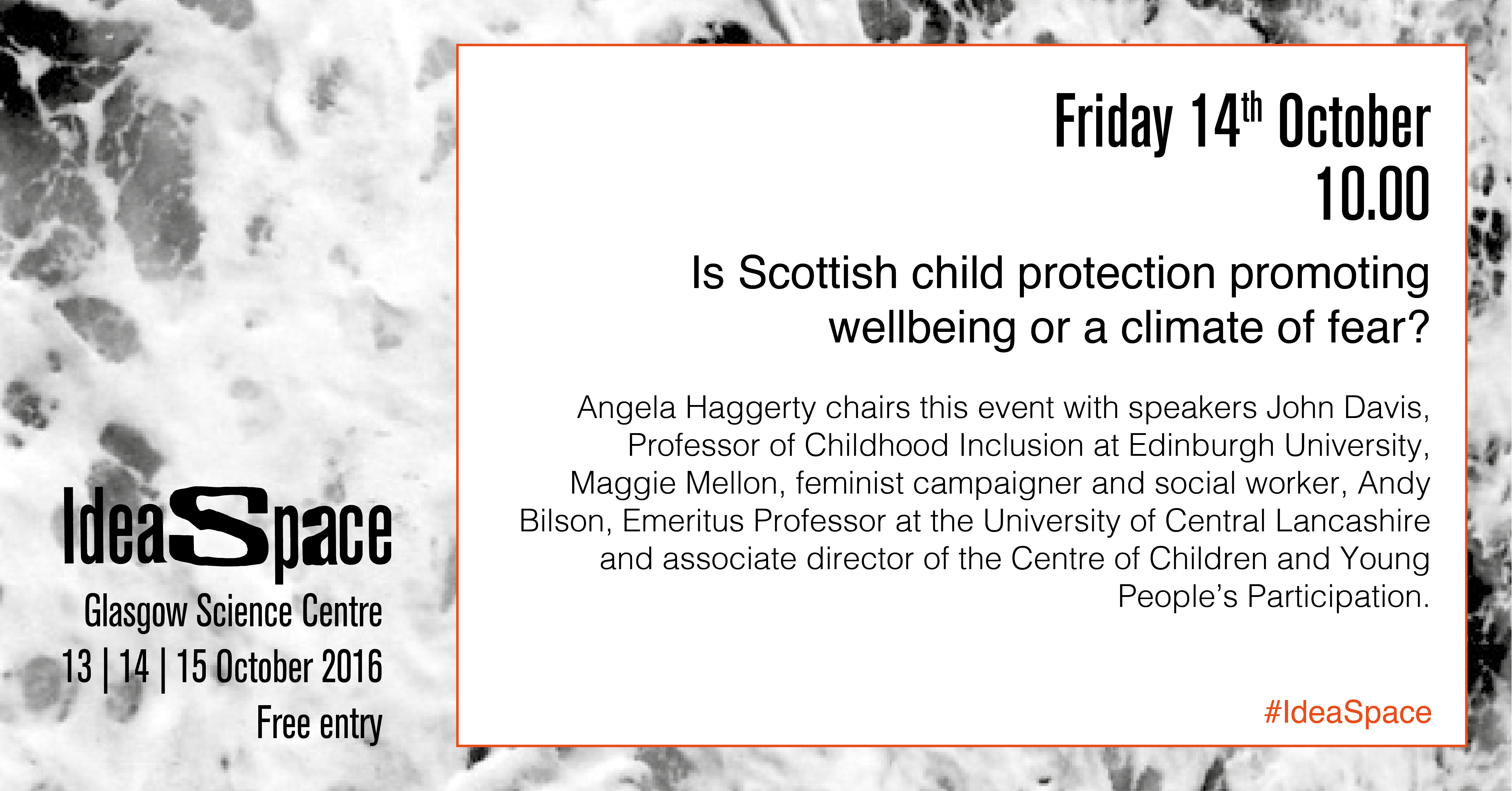
The debate’s chairperson started by saying that the Scottish Government’s Named Person policy had been the most debated subject on IdeaSpace’s website in recent times and when she later took a straw poll of the audience, those who were opposed to the scheme made up the largest group.
Social work consultant and NO2NP supporter Maggie Mellon was first to speak. She said she gave up statutory children and family work a few years ago because of the increased unnecessary intrusion into families’ lives, and the distrust between many of these families and social workers that often resulted.
She argued that the Government had “taken a wrong fork” with its legislation, which had not helped the situation and that “Named Persons are not the answer” to the very real needs of families blighted by poverty. Named Persons observe poverty as “risk” rather than “need”.
Next up was Professor Andy Bilson, Emeritus Professor of Social Work at the University of Central Lancashire, who spoke about his research into referrals under the child protection system.
He referred to a study of trends in physical abuse and neglect in six countries, focusing on children under 11, which had concluded that there was “no clear evidence for an overall decrease in child maltreatment despite decades of policies designed to achieve such reductions”.
Prof Bilson also pointed to research he had carried out in Western Australia, where, following the introduction of wellbeing legislation in 2006, referrals and reports on alleged harm had doubled over the first three years, yet there was no increase at all in the actual instances of harm.
He argued that there needs to be a new way of thinking that moves away from a singular focus on abuse and its prevention, and instead builds social capital in deprived communities and encourages advocacy and representation, rather than dictating what professionals believe to be best.
John Davis, Professor of Child Inclusion at the University of Edinburgh, started his talk by saying that he tells his social work students (jokingly!) that he is training them to become “storm troopers for the state”! He went on to say that professional interventions can make things worse and instead there needs to be minimum intervention and collaboration with parents, aiming to find support in the community, like we used to.
During Q&A, in response to a question from someone who supported Named Persons, Maggie Mellon said it was hard to define emotional abuse, and to distinguish neglect from poverty. She said that help isn’t on offer for poorer families but parents will instead end up being judged.
Prof Bilson added that if social workers go in with an orientation that looks to blame, even if they find nothing, the family will be less likely to trust them in future.
SOCIAL WORKER EXPOSES ERRORS IN COLUMNIST’S ‘OTT’ SLURS
Posted 9 years agoThe Named Person scheme has received a lot of media attention recently. But not all of it is particularly enlightening. Take, for example, Dani Garavelli’s recent article in Scotland on Sunday criticising opponents of the Named Person scheme.
Maggie Mellon, an experienced registered social worker and independent consultant, sets the record straight and exposes the errors in Garavelli’s article.
Dani Garavelli’s piece in the Scotland on Sunday (Scare Tactics Put Children’s Lives at Risk, 13 March) criticises the campaign against the Named Person for ‘overblown rhetoric’, ‘emotive scare stories’ and hyperbolic statements rather than decent arguments. However, the boot is on the other foot, and her claims are rather let down by her own article, which is composed of rhetoric, scare stories and also badly thought-out hyperbole.
Dani Garavelli combined slurs with some very bad arguments. It seems that those of us who oppose the legislation are expected to have very thick skins in order to pursue our convictions. We are putting children at risk, and we only support parents’ rights and not children’s rights.
I have become used to expressions like ‘crazies’ ‘zoomers’ and ‘fruitloops’ being thrown around by supporters of Named Persons about those who try to warn of the dangers of this legislation. Iain McWhirter, writing in The Herald, had to preface his article stating very reasonable objections with the statement that he is not an evangelical or right-wing family values man.
I am not Christian, let alone evangelical, nor am I right wing. I did not home educate my children. I did not smack them. I am a strong supporter of every article of the UN Convention on the Rights of the Child. I have never been diagnosed as mentally ill. But if I had been, I would be chilled to read the insults, as they stink of exactly the kind of prejudice that may make life very difficult for children or families who are ‘different’ in any way – and of prejudice against people who put human rights ahead of supervision and surveillance, no matter how benevolent the intentions.
In claiming that opponents of the Act are ‘putting children at risk’ and that we are more concerned with parents’ rights than children’s rights, she is merely repeating unfounded slurs and criticisms that have been the hallmark of the defence of the Act, not of opponents of it.
I have written several well-thought-out criticisms of the legislation, and particularly of the lowered thresholds for intervention and information sharing – as have several others. The scaremongering over the last week or so has been all one way and the responses have been well-founded, without resort to rhetoric or slur.
Dani Garavelli repeats the claim being deployed by Government and supporters of the Named Person that children have died because of a failure to share information. There has not been a single child death inquiry which has found that children have died as a result of failure to share information.
Children who have died, in Scotland and in England and Wales too, have all been known to the authorities. Information was shared. Information sharing is not the issue. The very difficult thing to do is to correctly identify the level of risk, and to have the resources, relationships, skills and time to take the necessary action.
Using the threat of likely deaths of children to justify the imposition of Named Persons is therefore a totally fabricated scare story. Information can and should be shared about any child thought to have suffered or to be at risk of significant harm. This requires discrimination, sensitivity and a personal knowledge of, and relationship with, the parent and the child.
What the legislation requires instead is information sharing about any concern about a child’s ‘wellbeing’. Contrary to Garavelli’s assertion, the Government literature identifies these concerns as including choice in decorating bedrooms, TV programmes, and all sorts of other lifestyle issues. That’s what ‘wellbeing’ can encompass you see.
Garavelli offers a classic example of a badly thought out argument when she writes that ‘someone from Barnardo’s’ told her that ‘some doctors’ are not passing on information about children who present with repeated sexually transmitted diseases.
A sexually transmitted disease in any child under 16 years is a prime example of what is a child protection red warning sign of sexual abuse. Health professionals will be aware of that. If they fail to protect the child, or to inform others who can, then they need training and reminding of their responsibilities.
Instead, Garavelli and Barnardo’s think that this alleged failure on the part of a few doctors should mean that any teenager asking for the morning after pill should be reported to their Named Person. But – badly thought out argument alert – this will mean making teenagers reluctant to seek medical advice and help.
And parents too – if for example post-natal depression is thought to present a risk to a child that needs to be shared, and which might involve child protection and other intrusive assessments, parents are going to keep very quiet about it or any other problems.
And why should every Tom, Dick and Harry of a Named Person or teacher or social worker know about a young person’s private health concerns when parents are not even entitled to this information? What kind of country will this be when the state believes our children’s secrets are safe in their hands but not in ours?
The argument that alleged failure by a few health or other professionals to share information that they are supposed to share already necessarily means that nothing can be confidential for young people or parents is a classic bad argument.
What such an indiscriminate breach of confidentiality will cause is children and young people and parents being scared to seek advice and help.
That’s what I call a badly thought out argument. And also a serious risk to children and young people.
Read more by Maggie Mellon
NAMED PERSON IMPACT ON PRIVACY DISCUSSED AT HUMAN RIGHTS CONFERENCE
Posted 9 years agoAs part of Declarationfest’s human rights conference at Glasgow’s Centre for Contemporary Arts last week, the question of the impact of the Scottish Government’s controversial Named Person scheme on families’ right to privacy was discussed at a lunchtime seminar on Thursday.
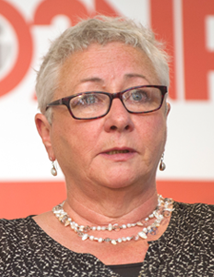
A representative of the Scottish Government had been invited to represent the case for the increasingly controversial legislation in a panel discussion with NO2NP campaigner Maggie Mellon, but despite several weeks’ notice, no one from the Government was available.
Given the widespread criticism of the Named Person scheme in three national newspapers over the previous weekend, one would think the Scottish Government would have made every effort to ensure that its side would have been heard, but the Government seat remained empty.
This meant that Maggie, an independent social work consultant and commentator, had quite a lot of time to explain the many problems with the scheme, as well as giving the audience plenty of time to ask questions, which they were very glad to do.
Maggie kicked off by explaining that despite the benevolent intentions that the Government and its supporters claimed for the scheme, a central problem was the dominant focus on child protection rather than on family and community support. The legislation makes no mention of consultation with parents or with children who may be in need of support and help, but instead explicitly sets out the power of Named Persons to ‘do as they see fit’ in response to concerns that they or other professionals may have about a child. Therefore rather than being an optional support for children and parents available at their request, the Named Person scheme will instead monitor rather than support parents
One of the key points Maggie put across was that needs are now being used as a measurement of risk, and that the insistence on child protection has changed the whole relationship between services and families, from providing help and support to monitoring parenting with a view to risk management. While universalism in services such as education and health is welcome, the universal imposition of Named Persons as a child protection measure threatens the right to private and family life.
The focus on parenting need fits with what has become a convenient dogma in Governments north and south of the Scottish border – that it is poor parenting rather than poverty and inequality that is at the heart of unequal outcomes for children. This at a time when poverty is affecting many children and families and inequality is increasing. In addition there is a failure to recognise the importance of the unique strengths and roles of families for the wellbeing of children, instead assuming that professionals are better judges of what a child needs than families.
There was an extended Q&A, during which a broad range of issues were raised. These included:
• The failure to recognise the rights of children to privacy and to confidential advice;
• Whether Named Persons would be told of medical treatment of children including teenagers even where parents were not informed.
• How many Named Persons a child might have before the age of 18?
• How many Named Persons a family might have to deal with in addition to all the other professionals?
• The increasing use of pseudo neuroscience to justify the removal of infants at birth from mothers.
• The costs and consequences of the Named Person scheme compared to providing services currently being cut?
• Whether Named Persons would be held responsible for any child deaths or injuries?
• How teachers would be paid for giving up holidays and weekends?
• Who would be the Named Person in the long summer holidays?
• Why the scheme was supported in the first place? Did no party see any flaw in it?
Maggie explained that there was widespread opposition to the Named Person as the Bill was going through Holyrood and significantly, The Law Society of Scotland, the social work professional association and many others had been against the scheme, but the Government chose to rely on the enthusiastic support of some major children’s charities.
• Whether the scheme is optional as the Government has said.
Maggie explained that she believed that if parents said they did not want a Named Person involved in their family’s affairs this would inevitably be regarded as a risk and would move the family into child protection investigation – if parents then agreed to a Named Person this could be viewed as “disguised compliance” and also seen as evidence of risk. In effect nothing short of enthusiastic compliance by parents is expected. Spanish Inquisition state of affairs!
One audience member pointed out that the children’s rights charity Clan Childlaw was very concerned about the issue of vulnerable children being able to share confidential matters with professionals without that confidentiality being breached. Clan Childlaw have been allowed to intervene in NO2NP’s judicial review appeal at the Supreme Court next week and to address the court on their concerns.
Would your family pass the latest Named Person ‘Orwellian’ state testing?
Posted 9 years agoIs your home cosy? Do your parents make you feel special? Who clothes you and cooks for you? These are just some of the questions nursery kids could be asked by Named Persons in surveys proposed by local councils.
And they plan to store all the harvested confidential information on one giant council database! Hang on a minute…!
Is it not obvious to all that this is fundamentally wrong and open to misuse?
Sample questions and potential answers are being used in Named Person training sessions to teach state officials how to subtly draw out information from children, interpret the answers, record it on a database and identify potentially ‘at risk’ kids.
One such system called “What I Think” has been developed for use with children from nursery up to age 8. Officials can select information from conversations with the child, and also drawings, photographs and recordings.
In the training Named Persons are encouraged to obtain information in a ‘natural’ way so that children don’t notice they are being questioned.
Sample scenarios designed to show Named Persons when a child could be deemed ‘at risk’, included a child not missing their mother when they stayed overnight at their granny’s, or a child being shouted at by their father after having an accident when playing alone in the park.
Maggie Mellon, a top social work consultant, Vice Chair of the British Association of Social Workers and former director of charity Children 1st, analysed the proposed system.
She told the Mail On Sunday: “The well-being indicators in this tool are clearly being used as a test of parents. They are not really about the child’s view, as there is no attempt to measure the child’s happiness or creativity.
“The examples given imply the nursery or school is a neutral place staffed by experts and the home is a hotbed of risk. In fact, most parents can tell you the stories that children bring home of shouting nursery workers, horrible, scary teachers and mean other children. Sometimes they just need to be heard and comforted and encouraged to see the other person’s point of view, although sometimes there is a need to act.
“But”, she commented, “parents don’t get to write down these people’s names and put them on a national database for other parents to have a good read, and add their own damning stories. Parents have to think very carefully about how to respond to what children say and how not to make things worse with a teacher who clearly does not like their child.
Maggie stated: “The examples given also encourage the teacher and key worker to record very positive things about themselves and not about parents. Would the key worker record that the child told them: ‘I hate you, you are mean’? Bias in key workers might be against parents who are poor, black, single, gay or posh… there is no warning of this in the guidance.
She warned: “The fact that these actually very biased and partial anecdotes will be going on a national database is extremely worrying and should make everyone sit up and say ‘No’. Overall, this is a crude tool with no validity – but it will be used and the information interpreted as evidence of child abuse or neglect.”
Dr Stuart Waiton, senior sociology lecturer at Abertay University, said: “A major problem with the Named Person professionals is that they appear to have lost any sense of the family as an important private institution for society. Trust, loyalty and privacy in their warped eyes are transformed into secrets being hidden ‘behind closed doors’.
He added: “Once we see every child as vulnerable and every family as potentially toxic, the result is that professionals see less of a problem with interfering in the private lives of children and parents.”
A NO2NP spokesman described the situation as ‘creepy’, and warned: “Psychologically manipulating youngsters so you can squeeze confidential information out of them is fundamentally wrong – but to store all this information on a giant council database is astonishingly foolhardy.
He added: “Parents are going to have to tell schools and local authorities to stop spying on their children. It really is beyond time that the Scottish Government called a halt to this whole charade before they do any more damage. It’s Orwellian, it’s immoral and it has to stop.”
SENIOR SOCIAL WORKER SAYS LET NAMED PERSON SCHEME ‘DIE OFF’
Posted 10 years agoThis month’s Holyrood magazine discusses the Named Person scheme, asking if Scotland is “any closer to becoming the best place for children to grow up”.
Answers on a postcard please…
Maggie Mellon, Vice Chair of the British Association of Social Workers and a supporter of NO2NP, was interviewed for the piece. Commenting on the Named Person scheme she said: “If the government was sensible, they would announce a delay in the implementation and just let it die off”.
The scheme is due to be implemented across Scotland next year despite serious questions about how it will operate.
The Holyrood article said Mellon “deems there to be no evidence to support the measure. It added that she believes the threshold for intervention is “lowered significantly” and that the legislation itself clashes with what proponents of the provision declare its intent to be”.
Mellon, who is also a former chair of the Scottish Child Law Centre, debated the Named Person scheme one-on-one with Jackie Brock, Chief Executive of Children in Scotland, at the organisation’s annual conference.
Watch Maggie Mellon speak at the launch of NO2NP last year where she asserted that “families are best for children, not services”. She says the state “makes a lousy parent” and warns that family is currently the biggest element missing from national policy.
NO2NP ROADSHOW: EDINBURGH
Posted 10 years agoThe large Salisbury Suite at the Macdonald Holyrood Hotel in Edinburgh was nearly filled to capacity on Tuesday morning for the first NO2NP Roadshow event since the summer break.
Dr Stuart Waiton of Abertay University in Dundee opened the meeting by saying that the autonomy of the family was being undermined by social policy across the board, with an overemphasis on “early intervention” by professionals to sort out children’s problems.
Liz Smith MSP then spoke about the huge mailbag she had received from people concerned about the scheme, which she says destroys the trust between families and professionals that is essential in bringing up a child.
She said that the scheme was “repugnant” and a “badly mistaken policy” that “diminishes resources”. The volume of support for the NO2NP campaign is growing all the time, with almost 12,000 people having now signed the petition. The appeal of the campaign “goes well beyond party politics” and the breadth of political views of those involved in it was “a good thing”.
She also pointed out that the bureaucracy of running the scheme would be enormous and too difficult to put into practice. The scheme has been “mis-sold” by the Government and the responses that concerned citizens have received have been “inaccurate” and “patronising”, she said. The Government, who are telling people how to live their lives, has not been shown in a good light, she added. In closing, Liz urged people to get involved, as it is “such an important campaign”.
Next up was Lesley Scott, Scottish representative for The Young ME Sufferers (TYMES) Trust.
She picked apart the three main arguments that have been used by the Scottish Government to justify the scheme:
1. “We’re doing all we can to help vulnerable children”
2. “We’re just formalising what we’ve been doing for ages”
3. “And Parents have asked for it.”
Lesley pointed out, firstly, that the word “vulnerable” does not appear anywhere in the legislation or the Government’s guidance and that their own QC admitted in the recent appeal case heard in the Inner House that every child is seen as potentially vulnerable. The corollary of this is that every parent is therefore viewed as potentially negligent or abusive. This will have a significant impact on how parents will be viewed and treated. If children, parents and associated adults do not agree with all of the Named Person’s views, then they will be treated as “non-engaging”: the balance has shifted dangerously in favour of the state.
The next argument – that local authorities are simply formalising what they have already been doing – has not been reflected in the attitudes of the professionals tasked with administering it, only a minority of whom think they currently have the capacity to gain an accurate and deep understanding of how to provide it.
And the contention that parents asked for the scheme is misleading at best, as parents with disabled children in the Highland region asked for a single, voluntary point of contact for accessing services. But that is not what they have got with the legislation and any success in the Highland Pathfinder has been shown to be down to other causes than the GIRFEC approach.
Lesley concluded by saying that the Government’s “disjointed excuses are shown to be a smokescreen and the true purpose of the legislation comes into view; it is a transfer of authority from your family to the state – an assault on the autonomous family unit”.
After a compelling new campaign video was shown, independent social work consultant Maggie Mellon spoke about her opposition to the scheme. She said that “parents are responsible for children’s upbringing, not services”, and that it is a very easy thing for professionals to display prejudice, when they don’t have the full picture. Civil servants have driven through this legislation but they haven’t thought through how dangerous it will be. People thought that they were getting a single point of contact, but that’s not what the legislation says. It doesn’t give parents or children the right to be consulted, as the Named Person is to take action “where he or she considers it to be appropriate to promote, support or safeguard the wellbeing of the child or young person”.
Commenting on the enormity of the universal scheme, Maggie remarked that “you can’t get all the sand on the beach through a little sieve”. A head teacher of a primary school isn’t going to have the time or the knowledge to explain your child’s needs to a range of professionals. Maggie said that she is against the Named Person scheme because “it’s wrong and it will cause damage”.
She said we should use the threat of compulsion far less than we do. She commented: “There’s too much compulsion and not enough compassion”. The Act moves the threshold from “at risk of significant harm” to “any concern about anything that might present a risk to a child’s wellbeing”. Instead of addressing the real needs of children, it is sinister surveillance. It’s not a point of contact for families to access services, she said, but a point for those services to access children. It’s as if the state is saying “We’re central, you’re peripheral”.
Nigel Kenny from The Christian Institute finished the formal session by taking everyone through the Action Packs that had been prepared for the meeting, before the usual lively Q&A finished off the meeting.
The next stop for the NO2NP Roadshow will be Glasgow on Monday 14th September at the Couper Institute, 86 Clarkston Road at 7.30pm – hope to see you there!
Announcing new Roadshow dates for May and June
Posted 10 years agoWe are pleased to announce more NO2NP Roadshows coming up in May and June.
Supporters from across Scotland often contact our team requesting a NO2NP Roadshow in their area and we do our best to try and make it happen.
Let us know if you would like one in your area by emailing: admin@no2np.org
It’s still surprising how many people are unaware of the Named Person legislation. Help us spread the word by telling people about the Roadshows. Experts will be sharing about the background to the plans and concerns surrounding the scheme.
DOWNLOAD AND SHARE THE FLYER
NO2NP Roadshow: Edinburgh highlights
Posted 10 years agoOn 23rd April the NO2NP Roadshow hosted a well-attended meeting in Portobello on the outskirts of Edinburgh. Dr Stuart Waiton chaired the event and spoke of the decline in the view of the family as an intrinsically good institution, instead it is now seen as the source of most children’s problems.
The first speaker was social work consultant Maggie Mellon, who said that it was “absurd” to assume that every child in a family “is potentially at risk and that information must be shared equally about all of them just in case”.
Then Lesley Scott of Tymes Trust, representing families of young ME sufferers, spoke about the shift in the Named Person legislation to focus on wellbeing meaning that “the threshold for intervention in a child’s life has been drastically lowered from ‘at risk of significant harm’ to that of a worry over something as intangible as wellbeing. This means that significant decisions are open to personal interpretation and bias on the part of the named person.”
Finally, Nigel Kenny of The Christian Institute gave some practical points, as well as an update on the judicial review appeal, which has now been fast-tracked to be heard by the Inner House on 3rd and 4th June.
NO2NP campaign – Latest developments
Posted 10 years agoThe NO2NP campaign is gearing up for a busy year ahead, with three roadshow events organised over the next few weeks. The first is next Wednesday (21st January) at Howden Park Centre in Livingston where speakers will include social services consultant Maggie Mellon, Tymes Trust representative Lesley Scott, and James McIntosh, a parent who has already been affected by the scheme. The meeting will start at 7:30pm, is free, and all are welcome
Meanwhile, media interest in the named person continues. Writing in The Daily Mail last week, commentator Gerald Warner accused politicians of having “nationalised our children” noting that “legislation has recently been passed marginalising parents’ authority over children by the appointment of a ‘named person’ to monitor minors on behalf of the State.”
In terms of the next developments for the campaign, we await the commencement of The Scottish Government’s consultation on guidance to accompany the legislation, as well as the legal judgment on the judicial review which has been lodged against the scheme.
NO2NP Roadshow review: Aberdeen & Irvine
Posted 11 years agoThe two latest outings of the popular NO2NP roadshow were in Aberdeen on 15th October and Irvine, North Ayrshire on 23rd October.
At the Aberdeen meeting, supporters heard from Liz Smith MSP, Young People spokesperson for the Scottish Conservatives. She described the named person policy as “slightly sinister” and argued that resources would be diverted away from the most vulnerable, hence defeating the purpose of the policy. She also said it was ridiculous that children aged over 16, who were recognised as adults, still required a named person.
Next up was Maggie Mellon, a consultant and writer on social work and children/family issues. She said that government shouldn’t get involved in parenting, and lamented a preoccupation with risk and safety.
The audience were also addressed by Lesley Scott, representing Tymes Trust, who work with children suffering from ME. She said it was unclear what will happen when parents and the authorities disagree and that it would be a “minefield” for parents who choose not to engage. She also explained that the threshold for intervention had been lowered from risk of significant harm to the ‘SHANARRI’ indicators.
In the chair for the evening was Dr Stuart Waiton, a sociologist from Abertay University, Dundee, who expressed his concern that children may go to their named person to complain about their parents and that the authority of parents and families could be undermined.
The meeting in Irvine was addressed by Glasgow-based community paediatrician, Dr Jenny Cunningham, who explained that every child in Scotland would be assessed through the ‘SHANARRI’ indicators and that the legislation would oblige all health, education and social work professionals to identify any deficiencies in parenting and to arrange intervention. She also spoke of her concern about the impact of the named person on family life and said that parents were intimidated by the idea.
The next talk was given by Anne Cannon, a Glasgow-based mother of five, who said her two main concerns with the named person policy were the negative impact it would have on the relationship between parents and state agencies, and the fact that it would fail the very people the policy is meant to help.
The meeting was also addressed by local man, Councillor Tom Marshall, who sits on North Ayrshire Council. He spoke about the appalling ‘ChildrenCount’ surveys which have been operating in North Ayrshire and outlined some of the questions being asked of youngsters.
The next stop for the NO2NP roadshow will be PERTH (Salutation Hotel) on 12th November at 7:30pm, followed by MONTROSE (Park Hotel) on 26th November at 7:30pm. We hope to see you there.
NO2NP roadshow comes to Inverness
Posted 11 years agoThe NO2NP roadshow resumed last night (1 October) with a well attended meeting at Glenmoriston Town House in Inverness. This was the first time that the roadshow had visited the Highlands, which is where a pilot version of the named person scheme has already been implemented.
The meeting was chaired by Dr Stuart Waiton of Abertay University who argued that “parenting has been professionalised” and ridiculed the SHANARRI “wheel of misfortune” used to assess child ‘wellbeing’.
The first speaker was Maggie Mellon, an independent consultant and writer on social work and family issues, who said the legislation “represents a denial of families”. She noted that family isn’t mentioned in the legislation and that families are seen as caretakers on behalf of government, adding that “the state makes an absolutely lousy parent”. She argued that “there is no evidence to support the imposition of named persons” and predicted “a huge misuse of resources”.
Next up was Alison Preuss, Co-ordinator and Press Officer at Schoolhouse Home Education Association, who said that “children’s rights are being selectively applied”. She told the audience about the infamous ‘Evidence2Success’ and ‘ChildrenCount’ surveys which have been operating in different parts of Scotland. She also discussed the Highland named person pilot scheme, describing it as “very selective” and said that those parents in Highland who have complained have been ignored.
The meeting ended with an extremely lively and informative question and answer session.
The next date for the NO2NP roadshow is Wednesday 15th October in Aberdeen – full details available here.
NO2NP Roadshow: 3 more dates in October
Posted 11 years agoFollowing on from the success of the initial ‘No To Named Persons’ (NO2NP) roadshow meetings during August (in Glasgow, Dundee and Stirling) the tour resumes in October with three more dates. These are:
INVERNESS – Wednesday 1 October @ Glenmoriston Town House, 20 Ness Bank
ABERDEEN – Wednesday 15 October @ ACT Aberdeen, 33 King Street
IRVINE – Thursday 23 October @ Gailes Hotel, Marine Drive
Events will feature contributions from a range of experts such as Dr Stuart Waiton (Abertay University), Maggie Mellon (social work consultant/writer) and Dr Jenny Cunningham (Community paediatrician). There will also be an extended time of discussion where attendees can put their questions to the speakers.
All events will begin at 7:30pm, are free entry and open to all.
Please come along and spread the word.
NO2NP Roadshow kicks off in Glasgow
Posted 11 years agoFollowing on from the hugely successful launch of the No to Named Persons (NO2NP) campaign in Edinburgh back in June, the NO2NP roadshow kicked off in Glasgow last Thursday night (21 August).
A large crowd gathered at the St Mungo Museum of Religious Life & Art, close to the city centre, to hear various speakers explain why the Scottish Government’s plan to furnish every child in Scotland with a state-appointed named person is woefully misguided and has the potential to cause significant damage to ordinary families.
The meeting was chaired by Dr Stuart Waiton, a sociologist from Abertay University. Highlighting the importance of the campaign, Dr Waiton told the meeting: “I expect 90% of parents in Scotland don’t know this law exists.” He also condemned the current obsession with child safety issues, remarking that: “there is an unhealthy anxiety about child safety.”
A keynote speaker was Maggie Mellon, an independent consultant and writer on social work and child issues. She said the legislation “represents a denial of families” adding that “we have separated children and their rights from families and their rights”.
She was followed by Dr Jennifer Cunningham, a Glasgow based community paediatrician, who argued that the legislation would have the “effect of obliging all professionals to identify deficiencies in parenting and arrange intervention.”
This was echoed by mother of five Anne Cannon, who said: “I don’t believe this legislation will empower parents.”
The audience also participated in a wide ranging discussion with the panellists.
The next stop for the roadshow is Dundee this Wednesday (27 Aug), followed by Stirling (29 Aug) and Inverness (1 Oct), with further dates likely. Full details are available on the NO2NP website.






